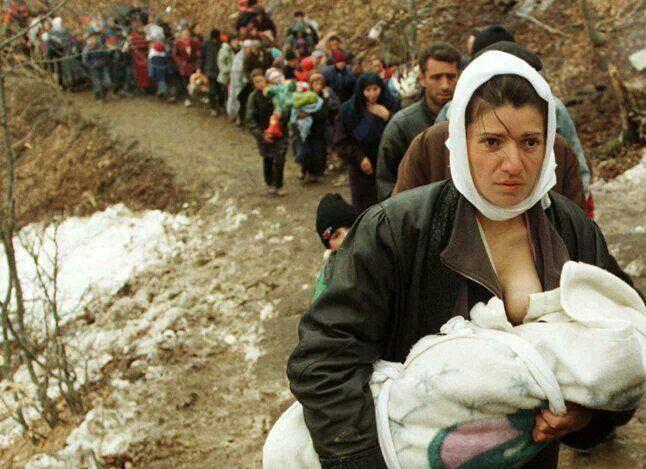
Twenty years ago today, NATO troops entered Kosovo and ended its war with Serbia, paving the way for Pristina to declare independence.
However, two decades later, the guns are still silent but mistrust runs deep between the neighbors, which have never totally normalized their ties.
Former Yugoslavian province Kosovo declared independence from Serbia in 2008, a decade after its ethnic Albanian fighters battled Serb troops in a war that cost 13,000 lives.
Turkey recognized Kosovo on 18 February 2008, the very first day following the declaration of independence.
The Cooperation Bureau of Turkey in Prishtina, which was opened in 1999, was upgraded to the embassy level in 2008.
Although it has been recognized by more than 100 other countries, including the U.S. and most of Europe, Kosovo has struggled to gain full global acceptance.
Serbia and its key allies Russia and China refuse to recognize the split.
In their view, Kosovo’s declaration of independence was illegal because it supersedes a 1999 U.N. resolution that put the former province under international protection.
That resolution, number 1244, gave Kosovo “substantial autonomy” within Yugoslavia, which Serbia was a part of at the time, and does not mention full independence.
However a U.N. court ruling in 2010 said the independence declaration did not violate international law.
With help from Moscow and Beijing, Belgrade has locked Kosovo out of the United Nations and other international organizations.
Last November Serbia also succeeded in skewering Kosovo’s efforts to join the global police organization Interpol.
That enraged Pristina, which shot back by slapping Serbian goods with a 100 percent tariff. The tax ultimately brought negotiations between Belgrade and Pristina to a freeze, with Serbia refusing to talk until the measure is lifted.
Despite domestic and international pressure to remove the tariff, Kosovo Prime Minister Ramush Haradinaj has refused, saying he will not budge unless Serbia shows a willingness to recognize Kosovo’s independence.
Kosovar President Hashim Thaci said on June 7 that he was hopeful about reaching a deal with Serbia this year on normalizing ties despite a recent increase in tensions and that a planned meeting on July 1 in Paris could prove a turning point.
Serbia’s President Aleksandar Vucic, speaking at the same event in Slovakia, said he was more pessimistic but that both sides must keep seeking a compromise.
There is no official census, but ethnic Albanian-majority Kosovo is still home to about 120,000 ethnic Serbs, who consider themselves loyal to Belgrade.
They are concentrated in the northern region around the divided city of Mitrovica, but also in a dozen predominantly Serb enclaves where Pristina has struggled to exercise its authority.
The autonomy of Serb communities is a major sticking point in the EU-led negotiations between the neighbors.
In 2013, an agreement called for the creation of an association of 10 Serb-majority “municipalities” in Kosovo.
But it has never been implemented, as Belgrade and Pristina cannot agree on the powers these communities would have.
In the mainly ethnic-Serb half of the Kosovo city of Mitrovica, locals use the Serbian dinar as currency and fly the country’s flag widely.
Pristina accuses Belgrade of funding a “parallel system” in the north by financing schools, health-care and public companies.
The two sides still do not mutually recognize their respective university diplomas.
Nor do the people in the north pay electricity bills to a Kosovo company, which the Pristina administration says costs them about 10 million euros annually ($11 million).
In 2018 Serbia and Kosovo’s presidents drew a frenzy of media attention - and criticism - for suggestions that border changes could be part of an eventual accord.
Neither side fully laid out the details. But media and analysts assumed the neighbors would trade small parts of their territories that are mainly populated by the ethnicity of the other.
The most probably exchange would see the Serb-dominated part of northern Kosovo given to Belgrade in exchange for Serbia’s southern Presevo Valley, which is home mainly to ethnic Albanians.
While Washington and some EU officials appeared open to discussing the trade, countries like Germany and Britain were firmly against it.
Rights groups and other critics also lambasted the idea, saying such a trade would deepen ethnic segregation and could have a dangerous domino effect in the fragile Balkans.
Belgrade and Pristina both claim ownership of property in Kosovo, notably the Trepca mining complex in the north and the Gazivode artificial lake, called Ujman by Kosovo Albanians.
Located in an area populated by ethnic Serbs, the lake plays a crucial role for Kosovo’s water supply and energy independence.
Trepca and its minerals also represent a rare source of wealth in the poor region, even if its industrial infrastructure is in an appalling state.
While most mines are on the ethnic-Albanian side of Mitrovica, the industrial complex is on the Serb side.